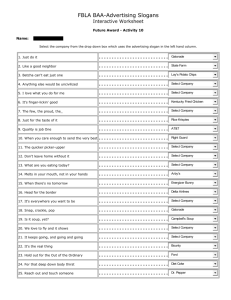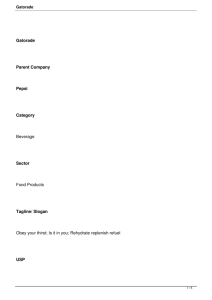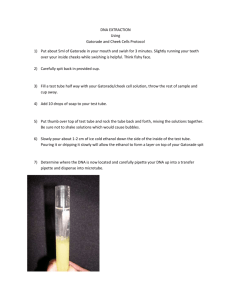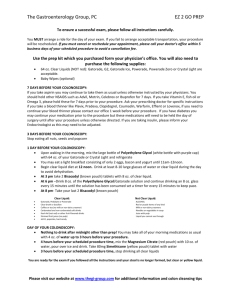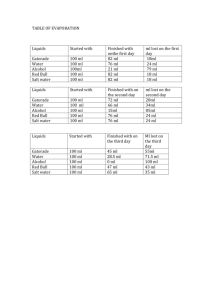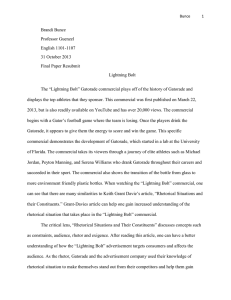Lesson 5.6 - Key Info in Mktg Plan
advertisement
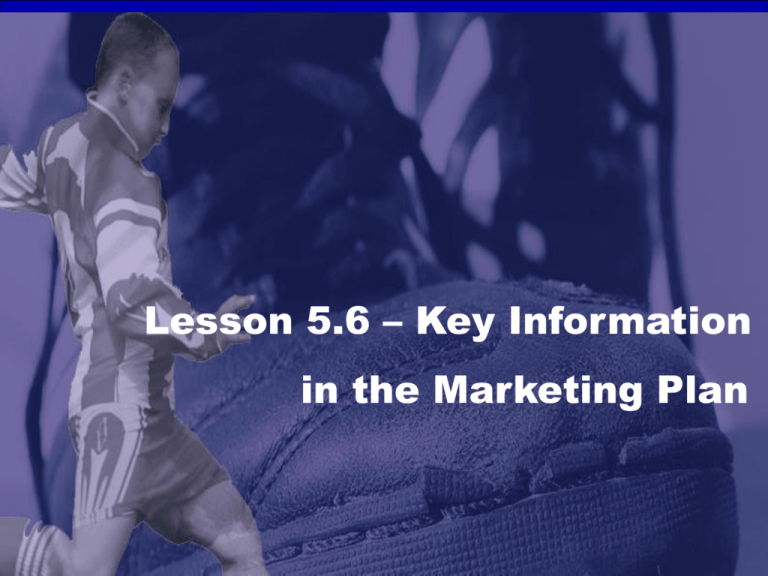
Lesson 5.6 – Key Information in the Marketing Plan The Marketing Plan LESSON 5.6 Key Information in the Plan In addition to a SWOT Companies must be thorough and detailed when including key information in their marketing plans Primary components of the plan Product Planning Marketing-Information Management Distribution System Pricing Promotional Strategies The Marketing Plan LESSON 5.6 Key Information in the Plan Companies must also consider numerous additional factors when creating their marketing plans Financing Risk Management Sales / Selling Execution Strategy The Future The Marketing Plan LESSON 5.6 Product Planning What event, product, or service will be researched, developed, marketed and ultimately sold via a pre-determined distribution channel? The Marketing Plan LESSON 5.6 Marketing-information Management Who are the company’s competitors? Who are potential customers? What characteristics define the target market? What motivates consumers to buy? How do we insure repeat purchases? The Marketing Plan LESSON 5.6 Distribution Strategy How will the company’s product get to the consumer? The Marketing Plan LESSON 5.6 Pricing • How much does the product cost the company to produce? • What is the optimal price for the product? • What is the estimated demand? The Marketing Plan LESSON 5.6 Promotional Strategies • How will the company integrate an effective promotional mix into the plan? • What forms of advertising will they use? • Will those decisions be cost-effective? The Marketing Plan LESSON 5.6 Financing • What is the projected overall revenue? • What costs are involved? • What economic conditions will influence marketing efforts? • What other factors should be integrated within the budget? • What is the time frame that should be considered? The Marketing Plan LESSON 5.6 Risk Management • What legal liability could the company face? • What laws could affect marketing strategies? The Marketing Plan LESSON 5.6 Sales What sales strategy will be employed? The Marketing Plan LESSON 5.6 Execution strategy How will the plan be carried out in a manner that will allow for the organization to accomplish its goals and objectives? The Marketing Plan LESSON 5.6 Execution Strategy Sampling of Vancouver Organizing Committee for the 2010 Olympic Games implementation strategy 1) Create awareness and excitement, across Canada, of the Olympic and Paralympic movements and the 2010 Games 2) Make the Games relevant to the entire country fostering the spirit of Canada’s Games 3) Generate interest and excitement in the corporate community The Marketing Plan LESSON 5.6 Execution Strategy Sampling of Vancouver Organizing Committee for the 2010 Olympic Games implementation strategy 4) Target companies and industries that are profitable and can afford the required investment levels 5) Create opportunities for sponsors to activate their sponsorships and maximize their return on investment throughout the entire term of the sponsorship agreements 6) Create a positive image and build a solid reputation of fiscal responsibility The Marketing Plan LESSON 5.6 The Future Where is the business going? What is the future for company competitors? The Marketing Plan LESSON 5.6 Plan Information Example Let’s assume you are an executive working for sports drink maker Gatorade Example of key information addressed in a marketing plan (hypothetical) The Marketing Plan LESSON 5.6 Product Planning Before Gatorade makes the decision to introduce any new products to the market, they must first develop a marketing strategy to help maximize beverage sales. They must also consider how to market existing products. The Marketing Plan LESSON 5.6 Marketing-information Management Gatorade must evaluate each of their competitors (VitaminWater, Powerade etc.) Identify the target consumers Understand how those make purchase decisions The Marketing Plan LESSON 5.6 Distribution Strategy Will Gatorade utilize a mail order strategy through EastBay? Will they create an online shopping portal to sell online? Provide product at retail stores? Which combination of distribution channels best fits their overall sales strategies? The Marketing Plan LESSON 5.6 Pricing What beverage production costs be? What range of potential price points makes sense for the product(s)? Will any discounting strategies be implemented? What type of demand can be expected for the new sports drink products at each of the price variations? The Marketing Plan LESSON 5.6 Promotional Strategies What will Gatorade’s promotional campaign include? What type of media will be utilized to communicate information about the shoe to consumers? Social media? Advertising? Endorsements? What will the budget be? Which promotional mediums will provide the best bang for the buck? The Marketing Plan LESSON 5.6 Financing How much beverage (volume) will Gatorade expect to sell? What is the forecast for gross income? What costs will Gatorade incur? Manufacturing? Packaging? Distribution? Inventory? Marketing? What is the projected net profit? The Marketing Plan LESSON 5.6 Risk Management Are there potential legal ramifications for Gatorade’s planned marketing strategy? Does the product pose any physical risk to consumers? Is there a risk of consumers getting sick from drinking the beverages? The Marketing Plan LESSON 5.6 Sales What sales strategy will help Gatorade to maximize the sales volume of the sports drinks? Personal selling? Online sales? The Marketing Plan LESSON 5.6 Execution Strategy How will the plan be carried out in a manner that will allow for Gatorade to accomplish its goals and objectives? The Marketing Plan LESSON 5.6 The Future What are the short term and long term goals for Gatorade? What does the future hold for companies like VitaminWater and Powerade? Are other beverage companies a potential threat in Gatorade’s product category? Why or why not? LESSON 5.6 REVIEW (ANSWERS) The Marketing Plan 1) Determine which information is important to address within the marketing plan Product planning, marketing-information management, distribution system, pricing, promotional strategies, financing, risk management, sales/selling and forecasts for the organization’s future are all integral components of the marketing plan.
